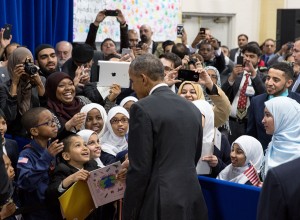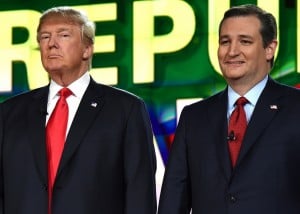by Amer Aziz
President Obama, in his first-ever visit to an American mosque a few weeks ago, reassured Muslims ‘they fit’ the American fold. The theme of his speech looked to balance anti-Muslim rhetoric reflected in polls showing unfavorable view of Islam and Muslims among Americans to be at unprecedented levels.
In September of 2015, Presidential-hopeful Ben Carson made news by stating that he would not want to see a Muslim become the President of the United States of America. This rhetorical pun implied that fundamental values of Muslims were incompatible with those of America. Donald Trump also came to be known to fan similar rhetoric.
However, surprisingly to some Americans, President Obama reminded us of what our founding fathers had to say about Islam, such as Benjamin Franklin: “If the Mufti of Constantinople sent a missionary to preach Mohammedanism to us, he would find a pulpit at his service.” And John Adams called Muhammed, “a sober inquirer after truth”.
Napoleon Bonaparte, a great icon of the renaissance movement that sowed the constitutional foundation of freedom and liberty in the west, had hoped that “one day all the wise and the educated of the world would unite under the principles of the Quran.”
So, why would such enshrined legends of our foundation and fundamentals lend honor and credence to Islam and Muhammad?
Academics have determined that such recognition is owed to the principles of freedom of conscience, respect for diversity and equal-rights enshrined in the ‘Constitution of Medina’ drafted by Muhammad. As Chief Arbitrator of Medina, Muhammad’s subjects included Muslims, Jews and Polytheists seeking peace and accord as one community. The Constitution of Medina established citizenry (and equality) before the state for a community with profoundly varying belief-systems in an era when social systems and laws were defined by the religion of those who prevailed over their subjects. It is the first such known constitution in history.
The inalienable rights of citizens are so remarkably similar between the Constitution of Medina and the US Constitution that Dr. Craig Considine, scholar of Muslim-Christian relations, writes that Muhammad and the founding fathers were, in fact, kindred spirits. And Alexandra Meave Jerome wrote in Oxford Islamic Studies that the American founding fathers were likely influenced by The Constitution of Medina.
The Constitution of Medina is not the only Islamic aspect that may have influenced modern civilization. Another legendary exchange that the Islamic legend had with the western world was in 14th century Spain. The city of Cordoba, during the era of Muslim-ruled Spain, was idealized for its leading-edge urban development, inspiring social harmony and educational excellence. Not far from Cordoba, in Toledo is where Arabic mathematical-numerals replaced the cumbersome Roman system, and along with the introduction of the concept of cipher (zero) opened a world of scientific progress for centuries to come. When Muslim-Spain neared the end of its reign, British explorer William of Morley endeavored to transfer Toledo’s legend over to Britain—a campaign that led to the establishment of the learning center Oxford.
But there are those who, without inquiry and under the sway of rhetoric, seek to sow discord and distrust. Whether they may be of the polemical or political inclination, their raw views lead to little else than demonization and xenophobia– much like that of the terrorists– and presents a threat to the transcendent ideals and common wisdom that unite us as one nation under God.
In the aftermath of San Bernardino, there was a drive-by shooting at the Baitul Aman mosque in Meriden, Connecticut and a toy hand-grenade was tossed inside the Baitus Salaam mosque in Hawthorne, California. Ironically, the names of both mosques mean abode of peace. Both mosques belong to the Ahmadiyya Muslim Community– a 19th century messianic movement established by Mirza Ghulam Ahmad who is held by Ahmadi-Mulsims as the messiah foretold by Muhammad and Jesus. The Ahmadiyya Muslim Community has, since its inception, propagated against the misconception of a violent jihad and for separation of mosque and state. It has built the first Muslim US Congressional Caucus advocating freedom for minorities persecuted for religion around the world.
Sadly, some of us have skirted dangerously close to ideology sported by the terrorists, and dangerously afar from the ideals of our founding fathers. If those who fan such rhetoric are allowed to prevail, it threatens to subvert our common heritage and the integrity of its foundation more than bombs and bullets ever could.


